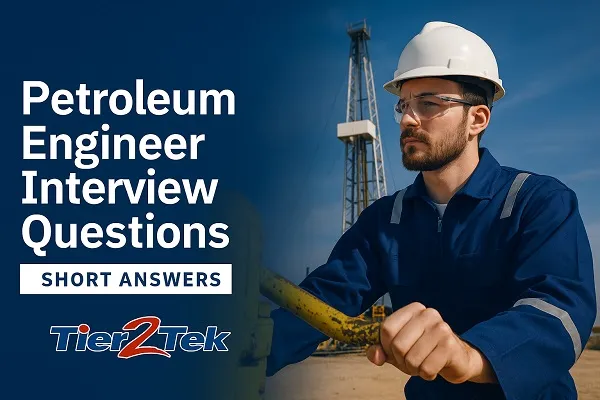Petroleum Engineer Interview Questions with Answers

Petroleum engineering is a critical field in the energy sector, focusing on the exploration, extraction, and production of oil and gas. Employers seek candidates who possess not only technical knowledge but also problem-solving skills, safety awareness, and the ability to work in challenging environments. To help you prepare, here are 15 common petroleum engineering interview questions along with concise sample answers that demonstrate key competencies and insights.
Interview Questions and Short Answers:
1. What does a petroleum engineer do?
Petroleum engineers design and develop methods for extracting oil and gas from underground reservoirs efficiently and safely.
2. What are the main phases of oil field development?
Exploration, appraisal, development, production, and abandonment.
3. What is reservoir simulation?
It’s a computer modeling process used to predict the behavior and performance of a reservoir over time.
4. How do you estimate reserves?
Using volumetric methods, decline curve analysis, and material balance techniques.
5. What software tools are commonly used in this field?
Petrel, Eclipse, CMG, OFM, and Pipesim are widely used.
6. What is porosity and why is it important?
Porosity is the percentage of void space in a rock; it determines how much fluid the rock can hold.
7. What’s the difference between primary, secondary, and tertiary recovery?
Primary uses natural pressure, secondary involves water/gas injection, and tertiary uses methods like CO₂ injection or thermal recovery.
8. How do you ensure safety on a drilling site?
By following standard operating procedures, risk assessments, and ensuring all equipment is inspected and personnel are trained.
9. What are the common challenges in drilling?
Wellbore instability, lost circulation, high pressure zones, and equipment failure.
10. What is a blowout preventer (BOP)?
It’s a safety device used to prevent uncontrolled release of formation fluids during drilling.
11. How do you deal with unexpected pressure surges?
By using pressure control systems, proper mud weight, and real-time monitoring.
12. What is enhanced oil recovery (EOR)?
EOR involves techniques to increase the amount of oil extracted, such as chemical, gas, or thermal methods.
13. What are your strengths as a petroleum engineer?
Strong analytical skills, teamwork, field experience, and proficiency in industry software.
14. How do you stay updated with new technologies?
Through industry journals, conferences, webinars, and professional networks like SPE.
15. Describe a time you solved a technical problem in the field.
While working on a declining well, I identified a blocked perforation and recommended acid stimulation, which restored productivity by 40%.
